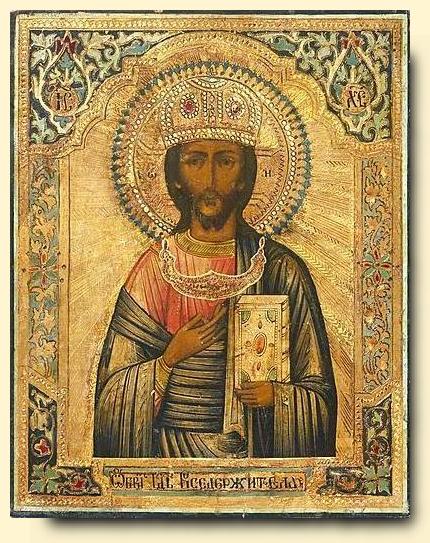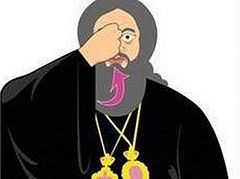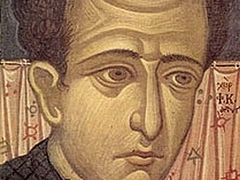Today and tomorrow we are presenting a series of four articles on the heresy of Chiliasm, or Millennialsm—that is, that Christ will have a literal, earthly kingdom lasting for 1,000 years at the end of time. This belief, popular amongst many Protestants today, arises from a misinterpretation of Scripture, and our saints and holy elders hold for us the key to properly understanding Scripture, and the end times, as far as it is given to us to know.
This fourth article is by Fr. John Whiteford from his popular blog "Fr. John Whiteford's News, Comments, & Reflections."
See the first article in the series by Elder Cleopa (Ilie) of Romania.
See the second article in the series by Bishop Alexander (Mileant).
See the third article in the series by Fr. Michael Pomazansky.
* * *

Orthodox Christians are often asked by Christians of various western traditions why we hold the theological position of amillennialism. Some object, stating that it is obvious that Satan is alive and active now and not confined, and they claim that Justin Martyr, Melito, Hegesippus, Tatian, Irenaeus, Tertullian, Hippolytus and Apollinaris were premillenarians. So, then, why is Chiliasm a heresy?
Firstly, I do not believe there is any clear evidence that St. Hegesippus held premillennialist views. St. Hippolytus actually changed his mind on this question, in favor of rejecting premillennialism. Tatian, Tertullian, and Apollinaris all ended their lives in heresy and schism, and so their views were clearly not mainstream.
St. Justin Martyr, while he did hold to a premillennial view, acknowledged that many in the Church in his time did not. He wrote:
"I admitted to you formerly, that I and many others are of this opinion [that there will be a future millennial reign of Christ], and [believe] that such will take place, as you assuredly are aware; but, on the other hand, I signified to you that many who belong to the pure and pious faith, and are true Christians, think otherwise" (Dialogue with Trypho LXXX).
Prior to the Church issuing a definitive statement on the issue, it was possible for saints, such as St. Justin and St. Ireneaus to hold such views, but at the Second Ecumenical Council, the Church added to the creed the phrase "whose kingdom shall have no end" immediately following the statement that Christ "shall come again with glory to judge both the living and the dead..." This was added to make it clear that there would be no temporary millennial kingdom, but an eternal one, as Scripture itself confirms:
He shall be great, and shall be called the Son of the Highest: and the Lord God shall give unto him the throne of his father David: and he shall reign over the house of Jacob for ever; and of his kingdom there shall be no end (Luke 1:32-33).
His dominion is an everlasting dominion, which shall not pass away, and his kingdom that which shall not be destroyed (Daniel 7:14b).
Premillennialism is based on an erroneous interpretation of Revelation 20:1-3, which states:
And I saw an angel come down from heaven, having the key of the bottomless pit and a great chain in his hand. And he laid hold on the dragon, that old serpent, which is the Devil, and Satan, and bound him a thousand years, and cast him into the bottomless pit, and shut him up, and set a seal upon him, that he should deceive the nations no more, till the thousand years should be fulfilled: and after that he must be loosed a little season.
The problem with interpreting this as referring to something that will happen after the time of the second coming of Christ is that you then have to believe that for some inscrutable reason, God would turn the devil loose a thousand years later, and that there would still be people in that millennial kingdom capable of being deceived by the Devil and rebelling against Christ, who has come in all His glory, with all the hosts of heaven. You also would have to believe that when Christ returns that the general resurrection would not take place then, but only a thousand years after that, and only then would final judgment take place:
But the rest of the dead lived not again until the thousand years were finished (Revelation 20:5).
And when the thousand years are expired, Satan shall be loosed out of his prison, And shall go out to deceive the nations which are in the four quarters of the earth, Gog, and Magog, to gather them together to battle: the number of whom is as the sand of the sea. And they went up on the breadth of the earth, and compassed the camp of the saints about, and the beloved city: and fire came down from God out of heaven, and devoured them. And the devil that deceived them was cast into the lake of fire and brimstone, where the beast and the false prophet are, and shall be tormented day and night for ever and ever (Revelation 20:7-10).
Such an interpretation does not square with what is stated clearly elsewhere in Scripture, that when Christ returns He will raise the dead and judge everyone:
For the Son of man shall come in the glory of his Father with his angels; and then he shall reward every man according to his works (Matthew 16:27)
When the Son of man shall come in his glory, and all the holy angels with him, then shall he sit upon the throne of his glory: And before him shall be gathered all nations: and he shall separate them one from another, as a shepherd divideth his sheep from the goats (Matthew 25:31-32).
For this we say unto you by the word of the Lord, that we which are alive and remain unto the coming of the Lord shall not precede them which are asleep. For the Lord himself shall descend from heaven with a shout, with the voice of the archangel, and with the trump of God: and the dead in Christ shall rise first: then we which are alive and remain shall be caught up together with them in the clouds, to meet the Lord in the air: and so shall we ever be with the Lord (1 Thessalonians 4:15-17).
... when the Lord Jesus shall be revealed from heaven with his mighty angels, In flaming fire taking vengeance on them that know not God, and that obey not the gospel of our Lord Jesus Christ: Who shall be punished with everlasting destruction from the presence of the Lord, and from the glory of his power (2 Thessalonians 1:7b-9).
See also 1 Corinthians 15.
It makes far more sense to understand the thousand years to be an indefinite time between the first and second comings of Christ. St. Andrew of Caesarea points out that often the number "one thousand" is used to refer to an indefinite number:
"By the number one thousand years by no means is it reasonable to understand so many years. For neither concerning such things of which David said, "the word which he commanded for a thousand generations" [Psalm 104[105]:8] are we able to count out these things as ten times one hundred; rather they are to mean many generations" (Andrew of Caesarea,trans. Eugenia Scarvelis Constantinou, Andrew of Caesarea, Commentary on the Apocalypse, (Washington, D.C.: Catholic University of America Press, 2011) p. 206).
As for the releasing of Satan and the deception of the nations to refer to the coming of the antichrist, and the last days before the second coming. The binding of Satan does not mean that he has no power at all during this period, but that he is restrained until just before the end of this age. This also aligns with what St. Paul said about the coming of the antichrist and the great falling away:
Let no one deceive you by any means; for that Day will not come unless the falling away comes first, and the man of sin is revealed, the son of perdition, who opposes and exalts himself above all that is called God or that is worshiped, so that he sits as God in the temple of God, showing himself that he is God. Do you not remember that when I was still with you I told you these things? And now you know what is restraining, that he may be revealed in his own time. For the mystery of lawlessness is already at work; only he who now restrains will do so until he is taken out of the way (2 Thessalonians 2:3-7).
St. Andrew of Caesarea says that this binding is what Christ spoke about in which He said that to spoil the house of a strong man, the strong man must first be bound (Ibid, p. 205f, cf. Matthew 12:29; Mark 3:27; Luke 11:21-22). This statement, in all three of the Synoptic Gospels, is in the context of Christ speaking of the power by which He caste out demons.
Most Christians, including Protestants, claim to believe the Nicene Creed, and the Nicene Creed is unambiguous on this point, and its statement that Christ "Kingdom shall have no end" is taken straight from Scripture. Some early fathers, who did not have the benefit of the instruction of the Second Ecumenical Council, have some excuse for being mistaken on this point; but now we have no such excuse.
The problem with premillennialism is that it tended to feed into other heresies, such as Montanism, which believed that Montanus was the Holy Spirit incarnate, and which believed that the Kingdom of God was soon to come to be established in Phrygia. We have seen similar heresies with millenialist eschatology in more recent times, with the Jehovah's Witnesses, Seventh Day Adventists, Mormonism, the Jim Jones Cult, and Branch Davidians. Given the excesses this view has tended to produce, the Church felt it necessary to clearly define the matter.



